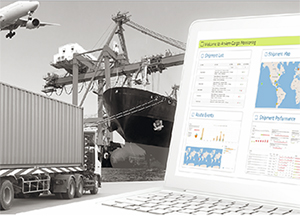Arviem AG, based in Zürich, Switzerland, recently announced the launch of real-time carbon footprint monitoring in the logistics chain to support sustainability initiatives of clients.
The move occurs just at U.S. supply chain managers are coming to terms with the U.S. pullout of the Paris Accords.
Despite this setback, Arviem executives say sustainability initiatives are gaining momentum.
“With the pressing issue of the climate change, society is increasingly demanding that the logistics industry reduces CO2 emissions,” says Arviem CEO, Stefan Reidy. “Supply chain managers often need to be ready to face trade-offs; to focus on the needs of the business today while making sure the company follows sustainable and responsible practices.”
Spokesmen say that unlike other solutions on the market, Arviem's carbon emissions reporting is calculated based on effective transport data instead of the less accurate planning data.

Research shows that supply chains can be responsible for up to four times the greenhouse gas emissions of a company's direct operations, while transport is the 2nd highest emitter of greenhouse gases worldwide as reported by Eurostat. Considering that transport represents such a significant share of greenhouse gas emissions in the supply chain, it is crucial for organizations to account for the impact of their logistics processes in the environmental analysis of their supply chains.
“Companies understand that lowering the carbon footprint in their supply chain can not only substantially contribute towards the company's sustainability initiatives, but it has also quantifiable business effects such as lowering operational costs,” says Reidy.
He adds that to find out where carbon emissions are concentrated in the logistics chain and develop and put in place reduction plans, organizations are in the need of quality metrics and assurance. However, measuring the complete carbon footprint across a global supply chain is challenging, it is a complex task that is time and resource intensive.

The solution developed by Arviem enables exporters, importers, distributors and manufacturers of goods to understand what's going on in their supply chains with regards to environmental impact with granularity down to each individual shipment.
The new feature of Arviem's cargo tracking and monitoring service enables organizations such as Nestlé Canada and Douglas Products to gain visibility into the environmental impact of the movement of their goods across the supply chain by using Arviem's monitoring devices.
“Here at Douglas Products, we strive for the highest standards in stewardship for our products,” says Heather Kern, Commercial Leader at Douglas Products. “Knowing where our product is located is a key part of our stewardship practices.”
She adds that the Arviem solution enables them to track products “around the globe”
“Companies can use the tools developed to monitor the carbon footprint in the logistics chain to make key business decisions, to reduce energy use and to lower their carbon footprint,” she says.
Supply Chain Visibility With Real-Time Cargo Monitoring

SC
MR


Latest Supply Chain News
- Aggregators sitting on the throne of Africa’s e-commerce supply chains: What lessons can we learn?
- Cross-border transport 2024: Navigating the surge
- Nine questions are the key to AI success in building resilient supply chains
- 2024 Warehouse/DC Operations Survey: Technology adoption on the rise
- Benchmarking the complexity of ESG reporting
- More News
Latest Podcast

 Explore
Explore
Business Management News
- 2024 Warehouse/DC Operations Survey: Technology adoption on the rise
- Benchmarking the complexity of ESG reporting
- Looking back at NextGen 2024
- The Corporate Sustainability Due Diligence Directive
- How to make your CFO a supply chain superfan
- Manufacturing again contracts in October, reports ISM
- More Business Management
Latest Business Management Resources

Subscribe

Supply Chain Management Review delivers the best industry content.

Editors’ Picks





